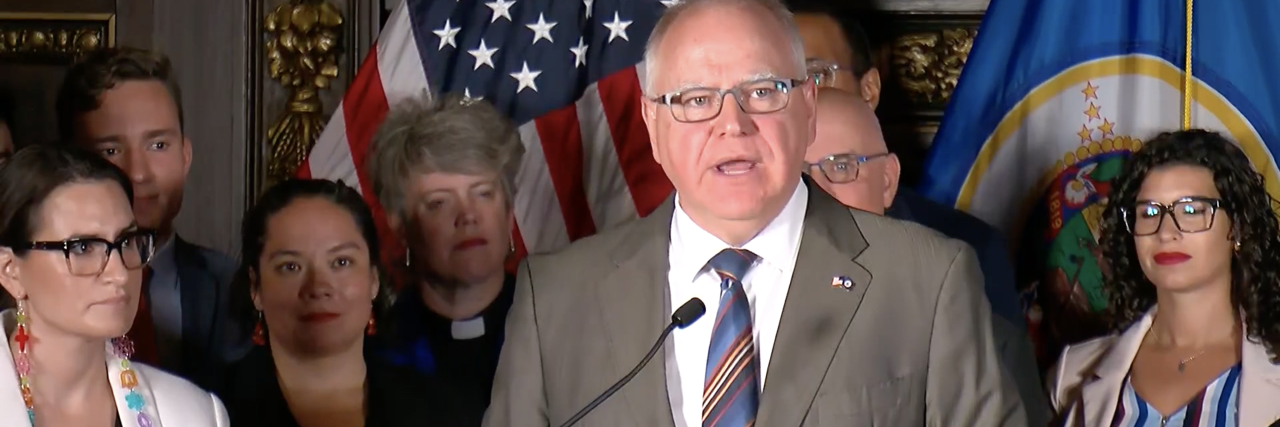Why the Minnesota Ban on 'Conversion Therapy' Matters to LGBTQIA+ Mental Health
Editor's Note
If you have experienced conversion therapy, acts of violence against the LGBTQIA+ community, religious trauma or have experienced suicidal thoughts, the following post could be potentially triggering. You can contact the Crisis Text Line by texting “START” to 741741.
Minnesota governor Tim Walz signed an executive order banning a harmful anti-LGBTQIA+ centered treatment called conversion therapy within the state, just a week before the state celebrates Pride. Speaking at the formal signing ceremony, he said that it’s just one part of an effort to support the LGBTQIA+ community within the state.
“There is no place for hate in this state … Our LGBTQ+ community is part, and a huge part, of what it means to be one Minnesota,” Walz said.
The governor said that he considers conversion therapy to be a “byzantine, tortuous practice” and intends to protect minor Minnesotans by ensuring that no insurance companies within the state will cover it. Minnesota is now one of the 24 states that ban conversion therapy within its borders. While that is progress, it is still less than half of the states in the U.S.
Walz’s executive order only disallows public funding to pay for conversion therapy. A full ban requires the state legislature’s approval.
Senator Scott Dibble told Minnesota’s CBS station, “This executive order will do much to putting a stop to it here. However, executive orders are, by their nature, temporary. The legislature is not off the hook.”
A recent 2020 report published by the University of California Los Angeles School of Law stated that lesbian, gay and bisexual individuals who experienced conversion therapy were almost twice as likely to contemplate and attempt suicide. These numbers increase if the individual identifies as transgender, non-binary or gender nonconforming.
Eighty-one percent of individuals who went through conversion therapy said that they received the treatment from a religious advisor, while 31% experienced it through a health care provider.
Minnesota’s Family Council, a Christian organization whose mission is “to nurture and defend families by restoring biblical truth,” say that they are strongly opposed to the governor’s mission to protect the LGBTQIA+ community. The Council says that the order attacks patients, families and therapists as well as the Constitution.
The Council’s website reads, “We believe that attempts to alter or live contrarily to one’s God-given gender are distortions both of God’s design for humankind and of practical reality…[we] oppose efforts that encourage and celebrate the lie that gender can (and should) be changed like an outfit without consequence.”
The Human Rights Campaign applauded the Governor’s signing of the order and issued a statement celebrating the newly established safeguards for LGBTQIA+ Minnesotan minors.
“Governor Walz’s common sense Executive Order reflects best practice, expert medical voices and mountains of evidence demonstrating that the outcomes of ‘conversion therapy’ are devastating for youth. LGBTQ youth deserve to live their lives authentically, safe from harm. Today, Minnesota has taken another step toward the promise of full equality for all.”
The American Academy of Child and Adolescent Psychiatry, the American Academy of Pediatrics, American College of Physicians, the American Medical Association and many more professional medical institutions have reaffirmed that conversion or reparative therapy is “questionable,” “may actually cause emotional or physical harm to LGBT individuals, particularly adolescents or young persons” and “lack scientific credibility and clinical utility.”
Today, Idaho, Arizona, Wyoming, Montana, South Dakota, Nebraska, Kansas, Oklahoma, Texas, Louisiana, Arkansas, Missouri, Iowa, Indiana, Kentucky, Mississippi, Tennessee, South Carolina, West Virginia, Ohio, Pennsylvania and Alaska have no state law or policy against conversion therapy.
To learn what you can do in your state to take action against conversion or reparative therapy, visit this site called #BornPerfect: The Campaign to End Conversion Therapy.
To read more, check out the following article from Mighty contributor Justin Utley on how surviving a suicide attempt after conversion therapy inspired his song “Scars.”
Lead photo via CBS Minnesota.

